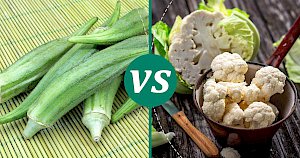Cauliflower vs Okra: Nutrition, Calories & Protein Compared


Cauliflower vs Okra
Nutrition Facts
Serving size:
change
5g10g15g20g30g40g50g60g80g100g120g140g160g180g200g220g250g300g350g400g450g500g600g700g800g900g1000g
1oz2oz3oz4oz5oz6oz7oz8oz10oz12oz15oz20oz25oz30oz35oz40oz50oz
Amount Per Serving:
Serving size:
change
5g10g15g20g30g40g50g60g80g100g120g140g160g180g200g220g250g300g350g400g450g500g600g700g800g900g1000g
1oz2oz3oz4oz5oz6oz7oz8oz10oz12oz15oz20oz25oz30oz35oz40oz50oz
Amount Per Serving:
Cauliflower vs Okra 100g Compare
| per 100g | Cauliflower | Okra |
|---|---|---|
| Calories | 25 | 33 |
| Carbohydrates | 4.97 g | 7.5 g |
| Fat | 0.28 g | 0.1 g |
| Dietary fiber | 2 g | 3.8 g |
| Protein | 1.92 g | 2 g |
| Calcium | 22 mg | 81 mg |
| Iron | 0.42 mg | 0.8 mg |
| Magnessium | 15 mg | 57 mg |
| Potassium | 299 mg | 303 mg |
| Sodium | 30 mg | 8 mg |
| Zink | 0.27 mg | 0.6 mg |
| Vitaminium B1 (Thiamine) | 0.05 mg | 0.2 mg |
| Vitaminium B2 (riboflavin) | 0.06 mg | 0.06 mg |
| Vitaminium B3 (Niacin) | 0.507 mg | 1 mg |
| Vitaminium B5 | 0.667 mg | 0.245 mg |
| Vitaminium B6 | 0.184 mg | 0.215 mg |
| Vitaminium B9 (Folic acid) | 57 mg | 88 mg |
| Vitaminium C | 48.2 mg | 21.1 mg |
| Vitaminium E | 0.08 mg | 0.36 mg |
| Vitaminium K | 15.5 µg | 53 µg |
Exploring the World of Vegetables: Cauliflower and Okra
When it comes to enriching our diet with healthy, nutritious vegetables, cauliflower and okra are two standout choices. Each brings a unique set of flavors, textures, and nutritional benefits to the table. Before diving into the detailed comparison of their nutritional profiles, let's uncover some interesting facts about these two vegetables.
Cauliflower, a member of the cruciferous family, is celebrated for its versatility in the kitchen. From riced cauliflower to cauliflower steaks, this vegetable can take on many forms and flavors. Okra, often associated with Southern cuisine and a staple in dishes around the world, is known for its distinct texture and flavor, as well as its thickening properties in soups and stews.
Comparing the Nutritional Profiles
When choosing between cauliflower and okra, it's helpful to understand how their nutritional content can impact your diet. Here's a breakdown of their key nutritional data:
- Calories: Cauliflower comes in at 25 calories per 100 grams, while okra is slightly higher at 33 calories.
- Carbohydrates: Okra contains more carbs (7.5g) compared to cauliflower (4.97g).
- Fiber: Okra leads with 3.8g of fiber, against cauliflower's 2g, making it a great choice for digestive health.
- Fat: Both vegetables are low in fat, with okra having a minuscule 0.1g and cauliflower slightly higher at 0.28g.
- Protein: They are nearly tied in protein content, with okra at 2g and cauliflower at 1.92g.
When it comes to micronutrients, both vegetables offer a range of vitamins and minerals, but there are some notable differences:
- Okra is rich in vitamin A (375 IU), significantly higher than cauliflower which has none.
- It also surpasses cauliflower in calcium (81mg), magnesium (57mg), and vitamin K (53µg).
- Cauliflower, however, provides a hefty dose of vitamin C (48.2mg) compared to okra's 21.1mg.
- Both vegetables are excellent low-cholesterol choices, with zero cholesterol content.
What Does This Mean for Your Diet?
Choosing between cauliflower and okra largely depends on your dietary needs and preferences. If you're looking for lower-calorie options with high vitamin C content, cauliflower might be the way to go. On the other hand, if you're interested in higher fiber, vitamin A, and magnesium intake, okra is a fantastic choice.
Both vegetables are incredibly versatile and can be prepared in a myriad of ways to suit any palate. Whether you're making a crispy cauliflower pizza crust or a hearty okra gumbo, incorporating these vegetables into your meals can boost your nutritional intake while keeping things delicious and interesting.
In conclusion, both cauliflower and okra offer unique nutritional benefits that make them worthy additions to any diet. By understanding their nutritional profiles, you can make informed choices that align with your health goals and dietary preferences. So, the next time you're at the grocery store, consider picking up both to enjoy the best of what these nutritious vegetables have to offer.
Cauliflower 100g
25kcalCalories source
- 66% CARBS.
- 26% PROTEIN
- 8% FAT
Okra 100g
33kcalCalories source
- 77% CARBS
- 21% PROTEIN
- 2% FAT
Compares of cauliflower
- Cauliflower vs Artichoke
- Cauliflower vs Arugula
- Cauliflower vs Asparagus
- Cauliflower vs Beetroot
- Cauliflower vs Bitter Melon
- Cauliflower vs Bok Choy
- see all compares of cauliflower
Marcin Piotrowicz
calories-info.com creator
Healthy diet and healthy lifestyle promoter
Add comment